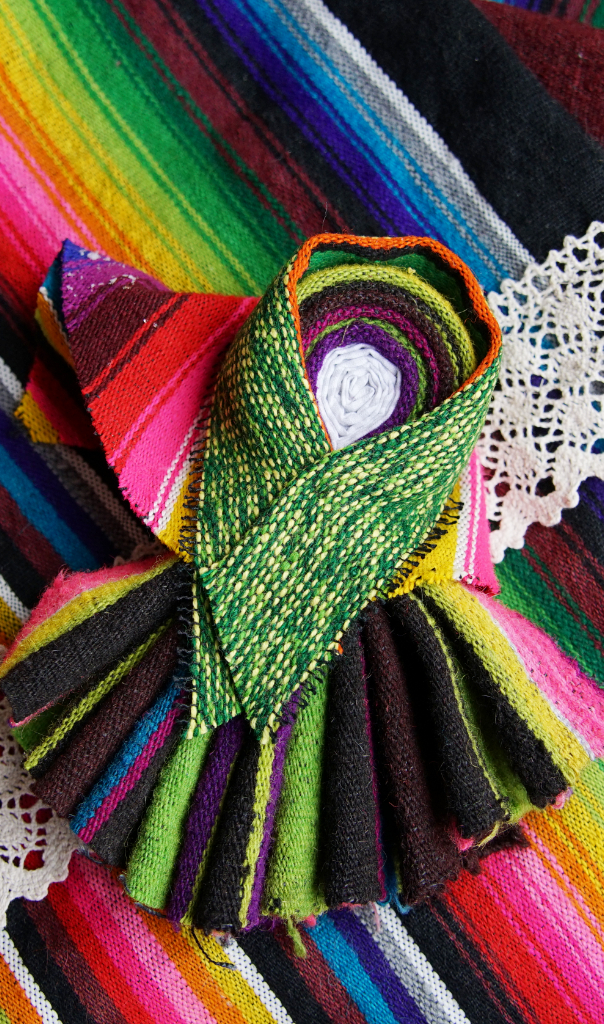Ethnographic lectures for KGWs!
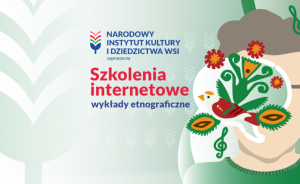
W listopadzie 2023 r. Narodowy Instytut Kultury i Dziedzictwa Wsi zrealizował cykl 16-tu wykładów etnograficznych oraz opracował materiały edukacyjne przeznaczone dla kół gospodyń wiejskich zainteresowanych dziedzictwem kulturowym swojego regionu. Zespół wybitnych ekspertów–etnografów przeprowadził cykl szkoleń dla każdego województwa.
The lectures presented knowledge about the peculiarities and diversity of folk culture of the regions of Poland, especially costumes. The first part of each lecture was devoted to the peculiarities of folk culture of a given region (voivodeship), covering such issues as: historical and natural conditions affecting the culture of the region and its ethnographic, ethnic and religious diversity against the background of the map of the voivodeship; distinctive features of ethnographic regions and groups (rituals, cuisine, folklore). The theme of the second part of the lectures was folk costume as an expression of local identity, positive and negative examples of costumes used by KGW, sources of knowledge on costume.
Wykłady etnograficzne do wysłuchania: Materiały edukacyjne – Dziedzictwo Wsi Polskiej
Handicraft workshops for KGWs
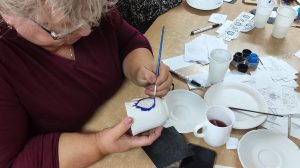
The end of November marked the end of the autumn series of trainings organized by The National Institute of Culture and Rural Heritage in the Kuyavian-Pomeranian province. The classes titled: "Handicraft Workshops for KGW" consisted of meetings of Rural Housewives' Circles with local folk artists, who imparted to the ladies the skills of producing folk handicrafts ethnographically compatible with the region of origin.
The first classes were held in Sokolow, located in Dobrinland, back in September (September 23). These were workshops on shuttle lace, known as frivolite. They were conducted by Ms. Teresa Buczyńska of the Supełek Club from Toruń, who introduced the difficult technique, which has been present in Polish lands since the beginning of the 19th century. The ladies of KGW became acquainted with the method of knitting shuttle knots, creating circles and pickets and bows.
Another workshop took place in Kolno, Chełmno Land. On September 30, Ms. Anna Przytarska gave a practical demonstration of what wicker basket weaving is all about. The ladies of KGW learned basic braiding techniques: weaves and how to build walls, borders and ends. They developed the acquired skills by making a basket (bowl) from wicker on their own.
On the other hand, on October 7, Kujawy embroidery came to Pinchata (or more precisely, to the firehouse in Warząchewka Polska) in Kujawy. Mrs. Henryka Derezinska showed the participants examples of embroidery and compositions used in the past in Kuyavian dress and today on napkins and tablecloths. On the prepared fabric, the ladies of the KGW transferred the pattern with embroidery elements such as twigs, half-leaves, ears, pearls and a rose flower while learning particular stitches characteristic of embroidery from this region.
On October 21, in Królikowo in the Paluki region, ladies from KGW met with Ms. Małgorzata Bołka at a workshop on traditional interior decoration. She acquainted the participants with the making of Paluki flowers from single-color crinkled tissue paper, traditionally arranged in rods, frames and garlands and serving as decorative of sacred corners in old cottages of the region. There was also the famous pyramid spider made of straw and tissue paper.
Meanwhile, the meeting in Sosna, on October 28, began with a presentation of the history, discussion of the color scheme and motifs of the country's embroidery by Ms. Kamila Krzanik-Dworanowska, Director of the Zlotow Land Museum in Zlotow. The participants, under the supervision of the Museum staff, then reproduced motifs from the embroidery, such as pomegranate, ear, poppy, bells, lily, chaff and cornflower, transferring them to board and faience.
The sixth workshop concerned tissue paper techniques and took place in Przymuszewo near Kęsowo in Bory Tucholskie on November 4. The participants learned, under the guidance of Ms. Małgorzata Barnat, how to cut, roll, twist and fold pleats on tissue paper. They developed these skills by making tissue paper flowers on their own.
The last meeting took place in Śliwice on November 18. Mr. Zygmunt Kedzierski acquainted the ladies of the KGW with materials and tools, as well as the technology of working with wood. The participants developed their acquired woodcarving skills by making a gingerbread block on their own. The topic was related to the traditions of gingerbread baking cultivated not only in Toruń, but also in many other centers of the Kuyavian-Pomeranian region....
The Circles will be able to use the skills acquired during the classes to create their own handicraft products. The workshops were held in local community centers, village halls and the headquarters of KGWs from the Kujawsko-Pomorskie Voivodeship to facilitate their mutual contacts and integration.
Many thanks to the creators for their willingness to share their knowledge and skills, and to the Circles for their active participation.
Text: Grażyna Olszaniec
Copyright for KGW!
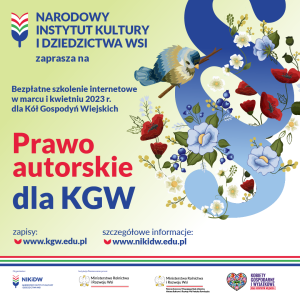
With the end of April 2023, a series of online training courses - webinars for rural women's circles on compliance with copyright laws in the activities of KGWs - organized by NIKiDW came to an end. 1,081 members from all provinces signed up for the trainings. Two webinars were held for each province.
The trainings addressed issues related to the need to respect copyrights in cultural and creative activities, especially those related to: handicrafts, design, musical works, recipes and private labeling.
Participants in the 1.5-hour webinars conducted by lawyers from the Office of Legal Counsel Zbigniew Rogowski learned, among other things:
- When do we have to deal with the person of the creator?
- What can be the subject of copyright?
- How do we determine when we are dealing with a work?
- What is subject to legal protection and why?
- How can we protect copyright?
Participants in the webinars also received information on how to dispose of their copyrights and when ownership of a copyright is not needed to use a work; what the consequences of not regulating copyright issues in the contracts being entered into may be; and when we are dealing with an inspired work and when we are dealing with copying someone else's work.
Na stronie Materiały edukacyjne – Dziedzictwo Wsi Polskiej dostępna jest prezentacja ze zrealizowanych szkoleń.
KGW at CITo!
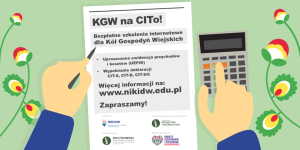
We have completed a series of online trainings for KGW entitled KGW on CITo! The trainings, organized by The National Institute of Culture and Rural Heritage, were devoted to keeping Simplified Income and Expense Records UEPiK and filling out CIT-8, CIT-D and CIT-8/O declarations. The trainings also discussed important issues related to: registration and statute of KGW, statement of income and expenses, financial flows, list of fixed assets and intangible assets.
The trainings, in the form of 30 free webinars, were conducted for Rural Housewives' Circles from all 16 provinces, from February 8 to March 29 this year. They were attended by 4,144 participants.
The webinars were conducted by Ms. Magdalena Bernat - an accountant. During the meetings, participants had the opportunity to ask the presenter questions. We provide a database of answers to questions most frequently asked by participants of KGW webinars on CIT-o! - Download the base of Questions-and-answers
For anyone interested in the issues covered in the webinars, we invite you to watch the training videos, available on the Institute's website:
Workshop for young folk musicians from Kurpie region

Edit 1:https://nikidw.edu.pl/warsztaty-dla-mlodych-muzykow-ludowych-z-kurpi-w-relacji-filmowej/
Edit 2: https://nikidw.edu.pl/za-nami-ii-edycja-warsztatow-dla-mlodych-muzykow-ludowych-z-kurpi/
